The Public Works Project: A Safety Valve for Yemeni Women!!
Caring for women, creating sources of livelihoods for a dignified life, and economic empowerment have been key objectives for the PWP. The PWP has worked to create income opportunities for women as social workers and engineers. Moreover, the lion’s share of projects implemented by the PWP were identified by women as priority. In doing so, the PWP has played an effective role in reducing hardships for women and restoring hope on the future, especially under the YECRP – funded by the World Bank and administered by the UNDP.

Activation of 50% of society, represented by women, is a strategy that has been adopted by PWP and implemented in the ground. This has been accomplished through the creation of work opportunities for hundreds of women as social workers, engineers, and consultants, as well as workers in construction activities carried out by contractors in the field: cooks, janitors, and workers for curing concrete structures.
Effective Women
Amriyah al-Odaini, a social worker in the PWP Management Unit, believes that the PWP gives top priority to women participation in the identification of projects to be implemented in target areas. This has been embodied in field visits by social workers to the local communities for meetings with women to sound out their hardships, feel their concerns, and identify their needs and priorities for projects.
Amriyah al-Odaini asserts that the PWP has succeeded in ensuring women participation in the identification of priority projects during the mapping and field study phase. In doing so, she said, the PWP has succeeded in transforming important groups in society, previously neglected and marginalized (women and persons with special needs), into key productive actors. This has contributed to a drastic change in the reality for women – to the credit of PWP.
Work opportunities for women have been created, where women have been recruited as social workers, engineers, and consultants to supervise construction activities in the field, and as workers performing functions, such as cooks, janitors, landscapers, and working to cure concrete structures, and other activities.
Benefits
Al-Odaini thinks that, as a social worker, the most important benefits she has gained under the current conditions are: training and new experiences gained through field visits and communication and outreach activities in the local communities, besides the financial compensation. In addition, women have also been beneficiaries and workers in various stages of the projects’ life cycle.
She adds: “My message as a social worker is that the YECRP is an excellent initiative working to reduce the hardship in society at large, and women in particular, by working to curb the deterioration of basic services most needed by local communities in their daily lives, and the creation of work opportunities for women. Our situation, as social workers, is the same as that of women in Yemeni society, in general - whether from the economic, social or environmental perspectives”.
New Skills
Intisar Kaidmah, a social worker, says: “The PWP has succeeded in creating equal work opportunities for women in the field, and contributed to the improvement of quality of life for many women - through projects implemented in the water sector, for example, where the majority of beneficiaries are women - considering that women are primarily responsible for fetching water for domestic use”.
An Important Opportunity
Kaidmah asserts that women in Yemen are hardworking and independent, but the current crises have affected her deeply: mentally, physically and economically. Many people have been forcibly displaced, their living conditions deteriorated, and increased their hardships by facing overwhelming economic burdens.
Capacities
Shaden Yaslam Bazuhair, from the Governorate of Hadhramaut - the coastal areas, says:” Thanks to the PWP, this initiative has helped women meet their needs to care for their children and education”.
Bazuhair adds: “Training of women by the PWP has had a positive impact and helped her prove to the community that women are capable of giving, overcome challenges, and able to provide for themselves”.
She says: “The PWP’s implementation of training programs targeting women is of crucial importance for Yemeni women, and aim at making them employable in the labor market, creation of work opportunities so that they can support their families, get to know daily routines, and identification of needs, as well as gain new experience, and creates opportunities for seeking work opportunities in other institutions. This is especially important because social perception of women have changed and women are now working in all fields”.
An Opportunity
Saidah Iskander, from the Governorate of Mahweet, points out that the PWP is promoting and encouraging women to play a leading and effective role. It’s doing it through effective engagement in project identification and beneficiaries committees, which facilitate communication and outreach with beneficiaries in the field, and in project management.
The PWP also train women in a number of economic aspects and by giving them opportunities to work and improve their lives.
From a social perspective, the PWP provides services in important sectors that help women, for example, the water sector, road paving, and the rehabilitation of schools - all these create a households and development connections.
A Major Role
Iskander reaffirms by saying: “Given the dire economic situation the country is experience, the role played by the PWP in recruiting women is a crucial one, helping to improve living conditions for many households, and in raising awareness on the importance of women participation in the labor force”.
Ms. Iskander called on the PWP to continue its effective support for women in field activities and education, such as field studies and intensification of training program to improve the lives of women.
Challenges
Ms. Iskandar is of the opinion that the most important challenges facing women today are some of the various old traditions in society which are rather restrictive, the perception that women are inferior, and lack of awareness in target communities on the importance of women.
Experience
Amal Mahfouz Baqreen, a social worker, in the Governorate of Hadhramaut - the Wadi (Seiyun), says:” The PWP has given women work opportunities, new skills and experiences in the field, and moved forward toward achieving the desired objectives to help women by giving them the right to work in community participation and reduction of the hardships suffered by Yemeni women through the implemented projects”.
Baqreen adds by saying: “Before working with the PWP as part of YECRP, I used to think I was restricted, but when I started work with PWP, I gained self-confidence, freedom of movement and I integrated with society which enabled me to share mutual concerns with the community.”
Baqreen also confirms: “Yemeni women - under the current crises - are experiencing severe hardships. This situation has become catastrophic and everyone now knows what the situation is like for women in this crisis”.
Improvement of Quality of Life
Salwa al-Akhram, from the Governorate of Sana’a, points out that implemented projects have succeeded in reducing the hardships of women, especially by providing water through construction of water reservoirs, tanks, and cisterns - by studying areas in need of such projects; thus, contributing to the improvement of living conditions for thousands of households who rely on agriculture as their main livelihoods.
Service Provision
As a social worker, Abeer al-Dhubaibi, from the Governorate of Raimah, considers the YECRP as a crucial step toward reducing community hardships, in general, and women in particular by working to curb further deterioration of much needed basic services. YECRP through PWP has been focusing on creating work opportunities for women and has been mindful of the need to integrate gender in the identification of needs, empowerment, and job creation for women.
Diligent Efforts in Support of Women
The term “gender” refers to social relationships as defined by society for men and women. These roles and relationships change as time and place have changed. These relationships are also variable within the different social institutions.
Roles
This means the roles carried out by both sexes as predefined by society for males and females. These roles are oftentimes associated with a set of behaviors that express prevailing societal values. It also defines the degree of both sexes adherence to the norms while performing their roles through a level of social acceptance. These roles can vary, for example: The productive role, which is associated with work carried out by women and men in exchange for a monetary compensation - either in cash or in-kind. It includes work with the aim of producing commodities that can be exchanged have a value, and can be sold in the market, such as domestic products that have a real value (can be sold and consumed).
Gender Mainstreaming (Promotion of Women Participation)
The Gender Unit in the PWP pays a great deal of attention to the promotion of women participation in the identification of priority subprojects in target areas. This is manifested in the PWP’s action to establish a gender unit in April 2017, and the appointment of a gender coordinator in the unit, aiming at:-
- Coordination and actions for the inclusion of women priorities in subprojects implemented by the PWP;
- Assists in the implementation of subprojects to serve women;
- Engaging women in all stages of the project’s lifecycle.
- Ensure sustainability of subprojects through the promotion of community participation (including women) in the different stages of the project’s lifecycle;
- Creation of as many work opportunities as possible for skilled and unskilled labor.
Social mobilization teams have been deployed to the local communities to meet with women, listen to their hardships, identify their concerns and needs, and the projects that meet their priorities and preferences. In doing so, the PWP succeeded in ensuring women participation in the identification of needed projects to be implemented in various communities - this process starts with the field survey and needs assessments in a community. Major achievements have been made in this aspect, most important are:-
- A female consultant has been appointed to work at promoting community participation of women – in the identification of subprojects. The main responsibilities are solely to ensure that women are consulted on their needs and priorities, selection of sites for the subprojects to be implemented, and actions associated with access and safety.
- 380 subprojects have been identified in 22 governorates, with the participation of women in nearly 80% of the subprojects offered in tenders until now.
- More than 359 women community councils have been formed, with the participation of 18,700 women in the selection and identification of priority subproject.- Efforts are continuing to engage women as workers during subprojects implementation. Many contractors have expressed a willingness to engage women from local communities in appropriate activities during the implementation phase. Field data reporting forms show that 1,456 women have taken part in construction activities at an average daily wage of YER 1,400.
- Female consultant engineers participate in various supervision activities over construction works. Until now, 355 female consultants have been engaged .
- During the identification of subprojects, women mobilization teams participate in awareness raising activities on the cholera outbreak by distributing various awareness materials (brochures and stickers) to village women. More than 38,000 various awareness materials have been distributed up to date. The PWP is now publishing an awareness newsletter to educate women on the cholera outbreak.
Relationship between Women and Objectives of the PWP
The activation of women participation in the development process has become an objective pursued by the PWP in the ground. This stems from the fact that the PWP recognizes the standing of women, as they represent 50% of Yemeni society, and to ensure the attainment of the objectives pursued by PWP, such as:-
- Ensuring the sustainability of projects by promoting community participation (including women) in all stages of the projects lifecycle.
- The creation of as much work as possible for skilled and unskilled labor.
- Provision of basic services for the most needy segments of society, especially women.
Mechanisms for Strengthening Community Participation for Women:
The PWP, through the Gender Unit, adopted an innovative mechanism to ensure the promotion of women participation based on:-
- Participation in the identification of priority needs for women.
- Participation in the selection of subprojects to be implemented.
- Establishing women committees and associations.
- Action to increase awareness.
- Linking women communities to governmental and non-governmental institutions.
- Increase linkages and cohesiveness among beneficiaries.
- Participation in training and project implementation.
- An action plan for operations, maintenance, and monitoring and evaluation.
Measures
In alignment with the PWP’s strategy, which aims at strengthening women participation, a number of procedures have been implemented to ensure the achievement of this objective, most important are:-
- Amending the PWP’s manual to serve women.
- Production of a field manual that ensures inclusion of women priorities in subprojects.
- Engaging women in the beneficiaries committees.
- Engaging women in all stages of the project lifecycle.
- Give priority to women engineers to supervise women-oriented subprojects.
- Stipulation that contractors would provide appropriate job opportunities to poor women during the implementation of subprojects.
- Raising of issues relevant to the needs of women and recommendations produced during consultations with women to the Project Management Unit – for study and inclusion in future planning.
- Introduction of the tasks and responsibilities of the gender coordinator to the PMU and branch directors to ensure cooperation and joint actions.
The Public Works Project: A leading Role in the Promotion of the Social Standing of Yemeni Women, Economic Empowerment, and Alleviation of Suffering and Hardships.
Women have been hired as social workers, supervising engineers to oversee project implementation in the field, and workers with contractors - as cooks and cleaners, a unique initiative deserving high regards and appreciation for the PWP. The PWP has succeed in the alleviation of the suffering of the Yemeni people as a result of the current crises, especially women, by implementing the Yemen Emergency Crises Response Program, YECRP - funded by the World Bank and administered by the UNDP. Through the YECRP, the PWP has succeeded in improving the living conditions of many women, said Dawlah al-A’ameri, who hails from the Governorate of Taiz, whether through the subprojects implemented in the water sector, where women stand to benefit being that women have the prime responsibility of fetching water for their households.
A Significant Opportunity
Ms al-A’meri said Yemeni women are hardworking and highly independent, but the current crises has taken a toll on them - mentally, physically and economically. The crises has caused many hardships and suffering including displacement, deterioration of living conditions and created overwhelming burdens on women. She said “the PWP’s implementation of training programs targeting women are of crucial importance: They help women in joining the labor market, create work opportunities that serve as sources of income for their families, identify daily routines and needs, as well as gaining new experiences and provide opportunities for job placements in other institutions – especially important, since women are now working in various fields leading to a change in social perception and attitudes.”
Women Experience Harsh Conditions
Afrah al-Hassani, from the Governorate of Abyan, says: “The PWP has created work opportunities for women, and a chance to gain new skills and experience in the field. Women can now forge ahead to achieve their desired goals, and the PWP has helped women by giving them access to community participation, and by alleviating their suffering through the implementation of development subprojects serving their needs.” Al- Hassani adds: “Before working for the PWP under the YECRP, I used to consider myself restricted and confined, but now I have gained self-esteem, freedom of movement, integrated, and now share everyone’s concern.” Ms al-Hassani, who works as a social worker, asserts “Yemeni women are experiencing extreme hardships under the current crises … the situation has become catastrophic, and everyone is well-aware of the kind of challenges facing women in this crises.”
Experience from the Field
Zubaidah Bader al-Sofi, from the District of Belad Al-Ta’am in the Governorate of Raimah, says: “the PWP has given women an opportunity to work, gain new skills and experience in the field, and forge ahead to achieve their desired objectives. It has helped women by given them the right to participate at the community level, and the alleviation of women hardships.”
Projects to Alleviate Women Hardships
Sameerah Abdo Yousef Mohamed Al-Qia’ari, from the Governorate of Amran, opined that the PWP’s initiative to engage women, and promote participation in the community, is an excellent one that should be continued in all regions of Yemen. She went on to explains by saying: “The living conditions are very difficult because of lack of work. Donors should continue supporting the YECRP, so that we can continue the field visits to help improve the living conditions for our families.” She asserts that the subprojects implemented in the water, agriculture, and education sectors have succeeded in alleviating the hardships suffered by women in an amazing way, especially in the water sector which is vital for life.
Successful Experience
Afrah al-Bukhaiti, from the Governorate of Ibb, thinks that the training opportunity she got from the PWP was an important development and community initiative, given the difficult economic conditions that Yemeni families have to endure - whether they are IDPs or people living in host communities. She adds that the transparency of the work done by the PWP has allowed equal opportunities for both males and females and provided easy access to women. She confirms that her work as a social worker in the PWP was an important milestone in her life “that has improved my income, and, thus, improving the living conditions for my family.” According to Afrah training has immediate and strategic benefits, including information, skills, knowledge and capacity building – an investment on the future, when we can harvest the fruit and improve the living conditions for women and their families. She confirms that the current crises caused major set-backs for pro-women activities, especially those targeting displaced women in the rural areas. Afrah al-Bukhaiti is of the opinion that the PWP had laid strong foundations for building community participation for women, especially in the rural areas, where a tangible role of women seems to be totally lacking.
Economic Empowerment for Women
Sua’d Abdul-Bari, from the Governorate of Hadramawt, said the PWP has played a positive role in the employment of women during the current crises, given that it has a pretty good sense of community needs, and gave women an opportunity to work in the subprojects implemented - thereby empowering them economically.
Sua’d confirms that women were subjected to discrimination despite the fact that they have strong capacities. But now, by being given the chance to participate in the selection of subprojects, women have been vindicated and now feel that they are a significant part of society - sharing and exchanging roles with men. She added: “That subprojects implemented in the water, agriculture, and education sectors have succeeded in alleviating the hardships of Yemeni women and created many benefits – the least of which, making better use of the time wasted in fetching water or irrigation.Acquiring New Skills
The PWP has played a major and effective role in the participation of women, by engaging women in the identification of priorities and needs in target areas, thus the incarnation of the role of women in the PWP. Sua’d adds “women are suffering and struggling under the current conditions, as their livelihoods are collapsing and have to face poverty and unemployment. Through the YECRP, the PWP has ensured women participation in the identification of priorities, creating a positive impact that has improved the living standards of Yemeni women, giving them new skills that make them employable. Through its training intervention, the PWP succeeded in qualifying many workers, especially women.
A Focus on Women
Taghreed Mohamed al-Shaheed, from the Governorate of Sana’a, asserts that the implemented subprojects have alleviated women hardships, provided better access to water by building water reservoirs, cisterns and tanks, and selected the most needy areas by conducting field studies and surveys before building such subprojects. This has resulted in the improvement of living conditions for tens of thousands of households – who are dependent on agriculture for their livelihoods.
Alleviation of Hardship
As a social worker, Aminah Mohamed al-Najdi, from the Governorate of Hodeidah, considers the YECRP as an extraordinary step towards alleviating hardship of the community in general, and women in particular. It has done this through prevention of further deterioration of much needed basic services. The YECRP has, through the PWP, focused on creating work opportunities for women, and paid attention to gender mainstreaming in the identification of needs, empowerment and the creation of work opportunities for women. Ms Al-Najdi added that the situation of social workers is similar to other Yemeni women, and due to the current situation, the living conditions of women have deteriorated to low levels: There is a lack of work, many organizations have closed, and foreign support for projects has been suspended. However, the YECRP has presented social workers with an opportunity and helped restore their living conditions to reasonable standard.
Sharing Expenses
Social worker, Aminah al-Najdi, asserts that Yemeni women currently share the responsibility of supporting their families, and for this reason, the YECRP has contributed to improving the living conditions for households in general, by creating income generation opportunities.
Major Benefit
She also added: “As far as I am concerned – as a social worker – I benefited a lot from the training courses carried out by the PWP, and from the field visits. This has given me both theoretical and practical experience. It also supported me mentally and boosted my self-esteem, broke barriers of fears and anxiety from dealing with other members of the community; and I have gained communication skills that have enabled me to communicate with the community, obtain accurate results, and gave the ability to overcome challenges. Ms al-Najdi continues by saying: “The situation of the Yemeni people in General – and women in particular – is well-known to many, especially in recent years. Hardships have increased due to the suspension of the payment of salaries - thus exacerbating the situation for women. This is on top of the destruction that have damaged the infrastructure, and the subsequent results of increasing burdens on women and the difficulties in accessing basic needs, such as: water, health, education…etc. Since women are responsible for most of the daily activities to provide for family needs, it was imperative to give women a bigger role in the identification of needs, access to services provided by the YECRP, realization of gender mainstreaming, and the development of the role of women, in general.
Success
Ms al-Najdi is of the view that implemented subprojects by the PWP have, to a large extent, succeeded in reducing the hardships of women – especially in the rural areas. It’s in the rural areas that women are responsible for fetching water from far distances and doing farm work, which leads to increased girls drop-out from schools. Thus, these subprojects have succeeded in saving time for women, enabling them to perform their daily activities at ease and in a better way. Training and qualification, especially when organized during the current crises and under such harsh living conditions, is a good opportunity for women to gain experience and helps trainees find more work. It also lends greater support to gender mainstreaming in the workplace and helps women in career development and qualify them to do community work.
Bigger Role
The social worker, Aminah al-Najdi explains that the PWP made a giant and important step in supporting and strengthening the role of women in subprojects selection, especially those needed by women. It’s also an important step in gender mainstreaming in the workplace and in the identification of subprojects. The PWP has also created work opportunities for women, even if they are temporary opportunities.”
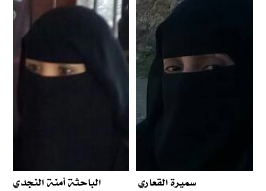
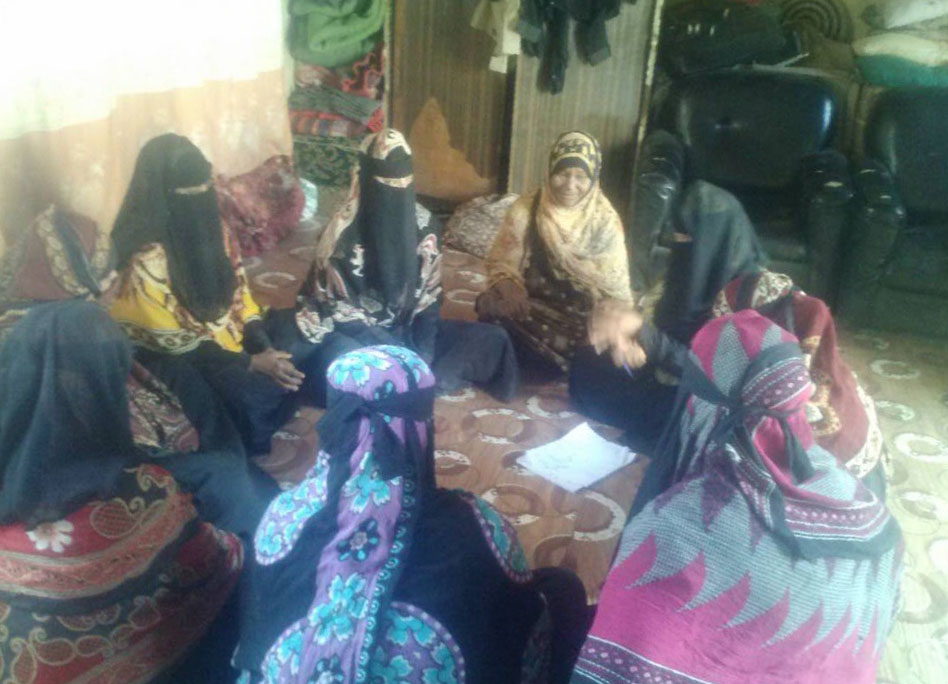
Implemented by the Public Works Project,
Women are Prime Beneficiaries of Water Projects.
Yemeni women are prime beneficiaries from water subprojects implemented by the PWP this year under the YECRP – a program funded by the World Bank and administered by UNDP. Usually, women are primarily responsible for fetching water to their homes for domestic use. For that, they have to travel rough roads and long distances under merciless scorching sun to reach the water source.
The interventions by the PWP in the water sector has alleviated the hardship suffered by women and improved the public health situation in the communities. This has saved women time and allowed them to enroll in schools instead of wasting their entire day on fetching water.
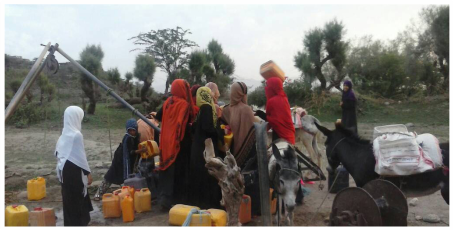
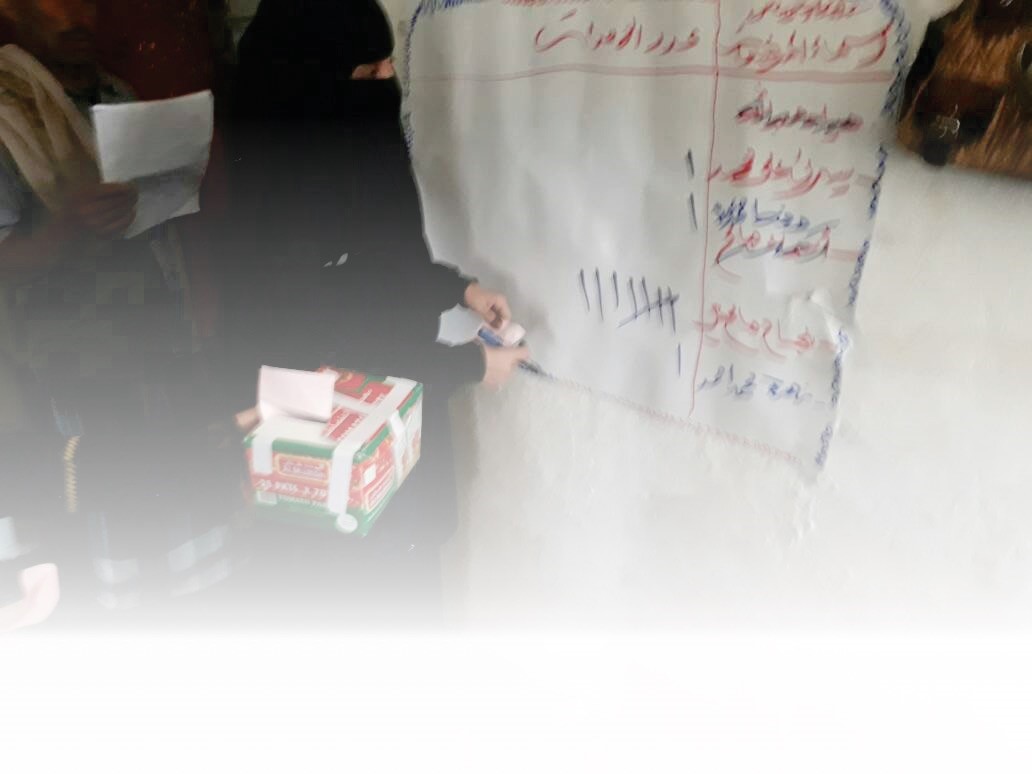
Mahani ..A Success Story for the Public Works Project
Mahani Zain al-Saqqaf, 30, an ambitious housewife, needed training and qualification to change the way she and the other women in her village in al-Daba area, Houta-Lahj lead their lives. Her first step was in the training program organized by the PWP for women in target areas: This program aims at promoting women participation in the identification of priorities for communities, and training on skills on women start-ups and management of income generation projects.
Mahani said: “Training was the start of an idea to change my life and become effective in my contribution to the improvement of my family’s living conditions. I started to apply what I was trained for by meeting with village women to raise awareness on the need for participation in the identification of needs for subprojects, how to interact with social workers, explain their hardships, and how to alleviate such hardships.”
Savings Fund
Mahani goes on by saying: “We started to form a women council (association), which would bring together all village women. We gave the village women an introduction about the PWP and the YECRP (a program funded by the World Bank and administered by the UNDP). In addition, we encourage women to participate so that they can express their needs for priority subprojects and acquire skills that enable them to work and be productive.”
Mahani added: “I made a suggestion for the creation of a savings fund, whereby women can fund small women projects, such as: sewing, embroidery, and sweets-making - the idea succeeded. We started the fund with YER300 thousands as seed money and continues to draw more women to the idea. Village women are excited about the idea and their husbands and relatives support it.”
A Good Idea
The encouragement of women to participate in development, especially under the current circumstances the country is experiencing, is an excellent idea, thanks to the PWP, the UNDP and the World Bank – the latter for funding the YECRP,” Mahani said. “Support should continue for the PWP to enable it to continue supporting Yemeni women in the alleviation of hardships created by the current crises.”, she added.
Tangible Impact
Mahani thinks that Yemeni women have borne the brunt of the current conditions in the country. By supporting women and alleviating their hardships, means support for 50% of the Yemeni society. The initiative by the PWP to support women, whether through subprojects implemented in the water, education or sanitation sectors; or through training, qualification and employments – as social workers, engineers and other activities with contractors - is a successful experience, which has left a positive and tangible impact on the target communities.
Sumayah, A Radio Broadcaster Pushing For Women’s Needs
“Women are the voice of peace that will be heard by warring parties because they are the most affected group.”
”Acceptance, satisfaction and success” were the expectations of Sumaya Sahloul during her participation in the Community Needs Monitoring training course.
Sumaya is a broadcaster and correspondent for local public radios in Ibb governorate. Through her work, she seeks to have a positive impact on the community, and this training course enabled her to come closer to community members and identify their needs. “I have acquired new and essential skills during the UNDP-funded training course organized by the Public Works Project (PWP). I have realized that I needed those skills to be able to work with local communities and identify their needs in order to highlight them through my work as a broadcaster,” says Sumaya. Sumaya is a persuasive young woman and attracts attention by her voice and calmness that reflect her high self-confidence and capability of highlighting community needs.
“Whoever works with the community should obtain the skills we gained during this training course, and learn the community-based participatory research (PRA),” she added. The training course targets women in the first place to provide them with the necessary skills to engage women in the work and rely on them as a primary source of necessary information to assess the community needs and help them determine the initial needs of the geographical area where they live and then take into account the standards to implement projects, such as the number of IDPs in the area, poverty rate and education and awareness level. “The most important parts of the community needs assessment are establishing familiarity and breaking the ice between community monitoring workers and beneficiaries to enable the beneficiaries to express their hopes, aspirations and basic needs. We have been trained on this part, which will facilitate our work to a great extent,” said Sumaya. “Engaging community members in defining their needs is a method that makes the project more effective and achieves interaction between the implementing agency and beneficiaries, and at the same time contributes to strengthening social accountability,” Sumayah emphasized. Sumaya believes that the equal engagement of women and men in the implementation of PWP’s emergency projects is an effective way to make the community accept women’s work in unfamiliar fields. “Much of the work that women are currently doing wasn’t accepted by society in the past, but women’s insistence on proving themselves through these activities is the main factor to make community members change their perceptions,” Sumaya added. Sumaya will continue her field work, provide community services and organize advocacy campaigns for the issues that are important for the community and women.
More Quotes by Sumayah:
“Nobody denies the role of women in their society. They were the first source of inspiration for men.” “During conflict periods, the voice of women, children and people with special needs must be communicated to enable them to express all their concerns.” “With the passage of time, people become aware about the great role of women in all aspects of life.”
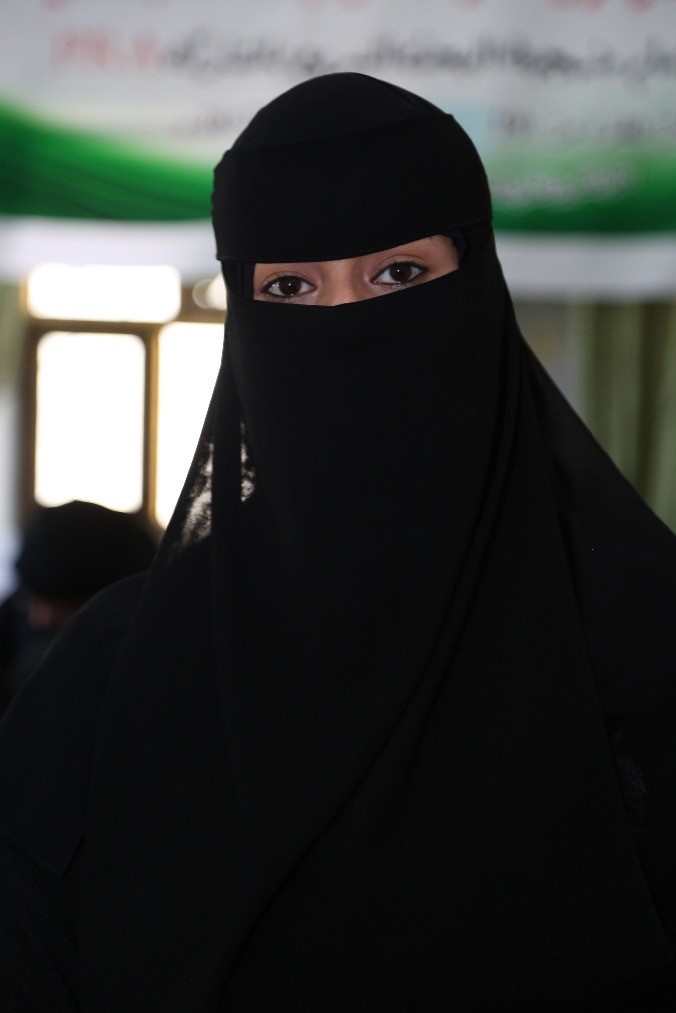
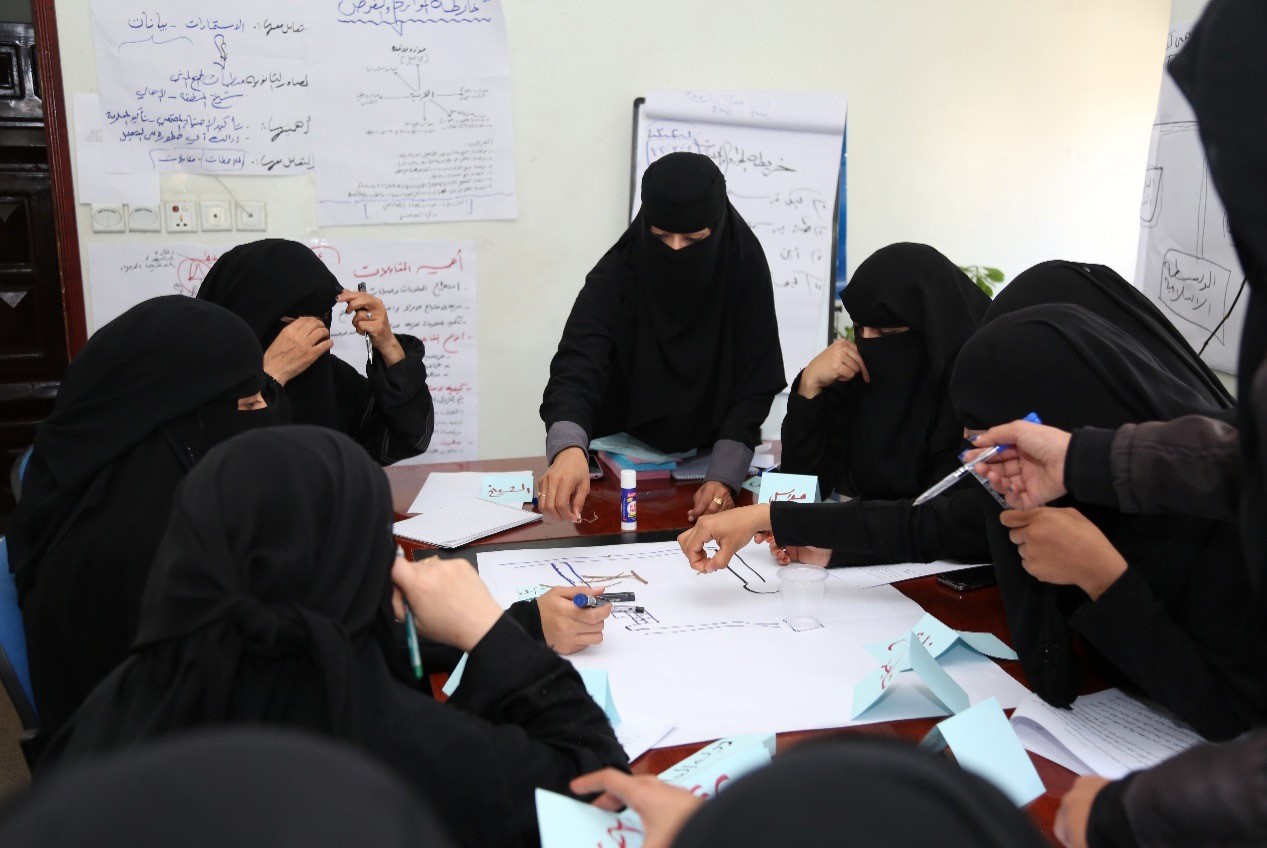
Supported by the Public Works Project, Female Engineers are at Work in the Field.
The Public Works Project (PWP), gives priority to women engineers to work in the field as supervising engineers for construction works in implemented projects. The move has left a huge impact in improving the living standards of their families, especially under the current crises which has cast a negative impact on working women, students, and homemakers.
The success of the PWP in its support for Yemeni women engineers has been proven in the way these engineers have improved their economic and living situations. The PWP has contracted single mothers who are the only supporters for their families. Engineer Safa al-Duhaish is one example. When she lost her husband, she took over the responsibility for caring for her three children.
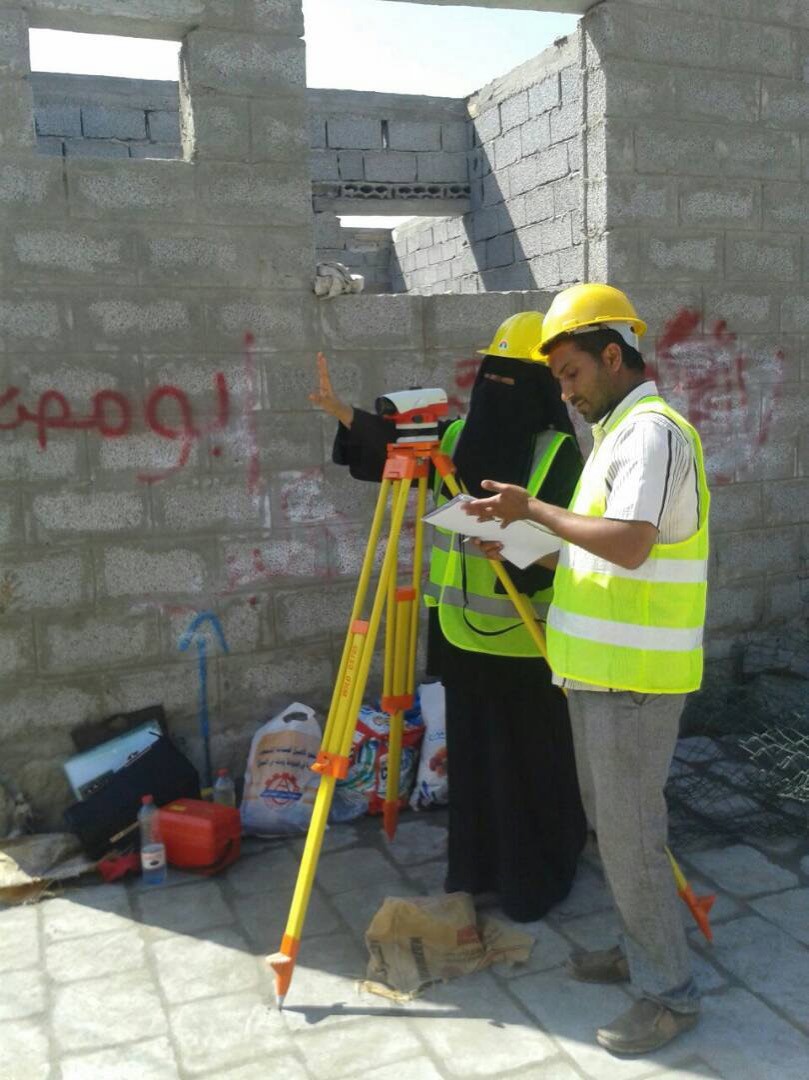
School Renovated by the Public Works Project: Thuraya is Continuing her Secondary School Education.
Al-Abass Secondary School in al-Ezzlah region of the Governorate of al-Dhalea’a is a mixed school for both girls and boys. Thuraya Sadeq Ahmed Mohamed goes to this school as a third-year student. Thuraya is the daughter of a basic education school teacher and has seven siblings.
Thuraya says:”al-Abass Secondary School was rather different last year. The school was semi-dilapidated…no desks, doors, or windows, and even the blackboards were so badly broken, we couldn’t make-out what’s written on them.”
A Miserable Situation
Thuraya Adds:”Winds used to make students feel sick because of there were no windows. If it rains, classrooms get inundated with water forcing us to go on a holiday. Due to heavy dust carried by the winds, we would go home with dirty cloths; and whoever sees us in that state, would be amazed to see us looking like that. They would doubt if we were school students. We would come to the school in the morning and we can’t study properly because there were no desks in the classrooms, gusty winds would be blowing right into the classrooms, and wide-spread dust clouds around the school makes the situation even worse.”
She continues by saying:” The school is not in close proximity to everyone, and I am probably the luckiest as I live closer to the school. However many girls have to travel long distances, some for an hour or more. But people consider the school a model secondary school and everyone competes to enroll in it. It has the highest number of registered students despite the existence of another secondary school in the area, but they all want al-Abass Secondary School - girls and boys alike.”
Thuraya dreams that one day she would become a doctor, and wants to do good in science so that she can achieve this dream.
She says:” The PWP, through the YECRP – a World Bank funded program administered by the UNDP, renovated al-Abass Secondary School, and restored it to its normal state. Now, it’s a school that embraces many residents of al-Dhalea’a from both sexes.”
An Inviting Environment
Thuraya added:”Now, we can study better, understand the information we receive from the teachers clearly, and words written on the blackboard are legible – we can now catch up lost time since the damages to the school caused the school-year to start late.”
This subproject has created a better school environment allowing students to learn and complete their school-year in a way that allows students to easily receive the information. The school environment has become more conducive and attractive.
Thuraya adds:” The faculty in this secondary school is the best governorate-wide. The teachers are smart, they are outstanding in their pedagogy, and have the ability to easily deliver the information to the students.”
Benefit to the Community
Thuraya continues by saying:” I am happy for the many benefits that we will have as female students or males or even the entire residents of this and nearby areas. This secondary school will definitely uplift the students and will produce a responsible generation able to tackle the burdens of life and deal with the evolving world around them.”
Thuraya knows that al-Abass Secondary School needs many additions, such as new classrooms that will reduce congestion in the classroom, and new laboratories for practical experiments and applications.
She points out that the student population in a classroom is big: Each classrooms has over 41 female students. Practical application of theories is also lacking due to the lack of school labs – although the teachers are capable of practical applications of the theories included in the textbooks.
Education is available
Following the completion of the renovation subproject in the school, Thuraya is now seeing tens of female and male students pouring into the school for learning and self-development.
She feels grateful that this admirable work serves the entire area, and hopes that similar subprojects will be implemented to service the whole community and alleviates the hardship people suffer from lack of proper educational facilities.
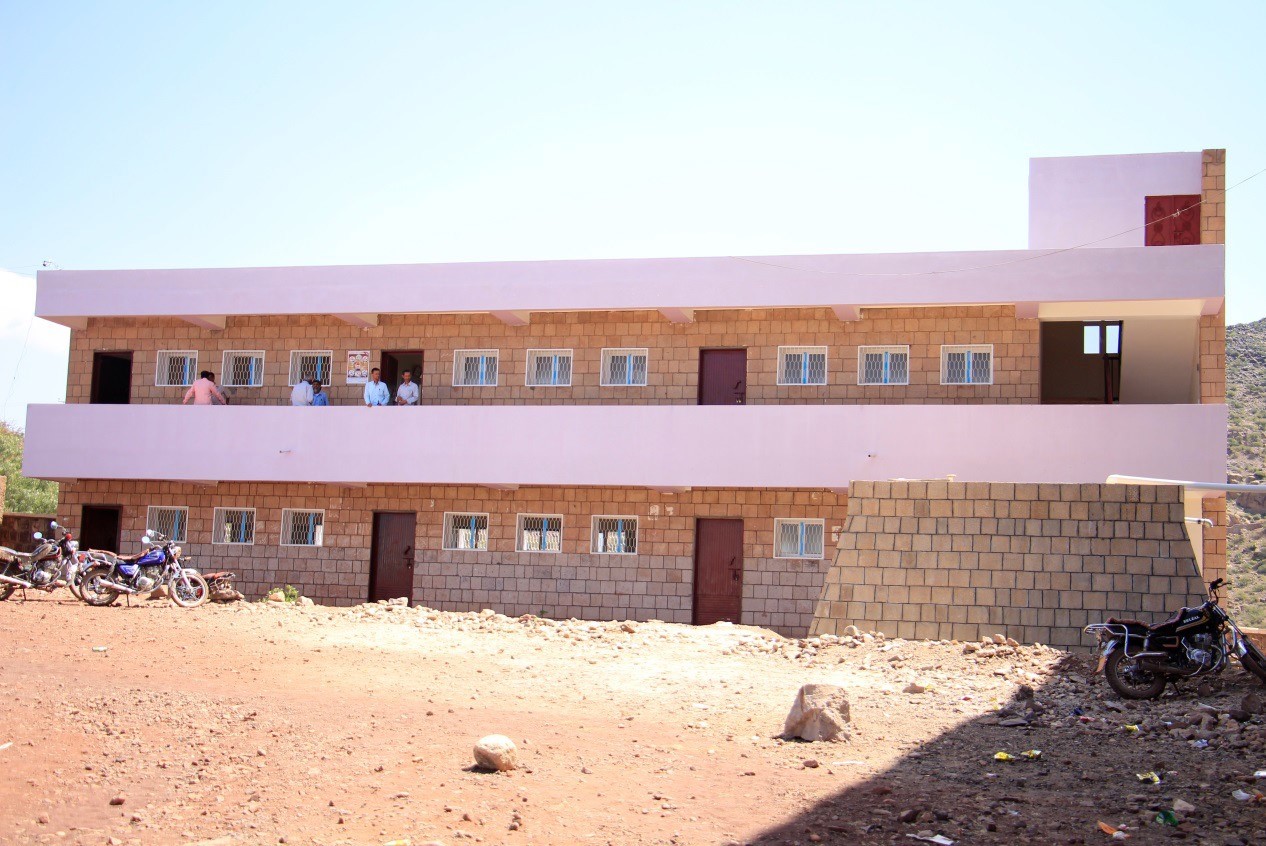
With the Participation of 3430 Women: 114 Community Women Councils formed
The public works project’s management puts major emphasis on women participation in the setting of priorities and project identification in target areas. This attention is reflected in the establishment of a gender unit in pwp’s headquarters.
By the end of june,2017 major achievements have been made to strengthen women participation,especially under the additional funding of the yecrp. 117 Subprojects were identified with women participation approximately 40% of identified subprojects so far. 114 Women community councils have been formed with 3,430 women who participated,and in 54 subprojects,number of women participating exceeded number of male thus ensuring selected subproject represents women high priorities.
Efforts to engage women in implementation phase as labor are being made on a continuous basis. Many contractors showed willingness to recruit women from local communities for some activities that are appropriate. Female consultant engineers are engaged in the various activities including supervision of construction. So far 65 female consultants have been contracted,approximately 15% of the total number of consultants.
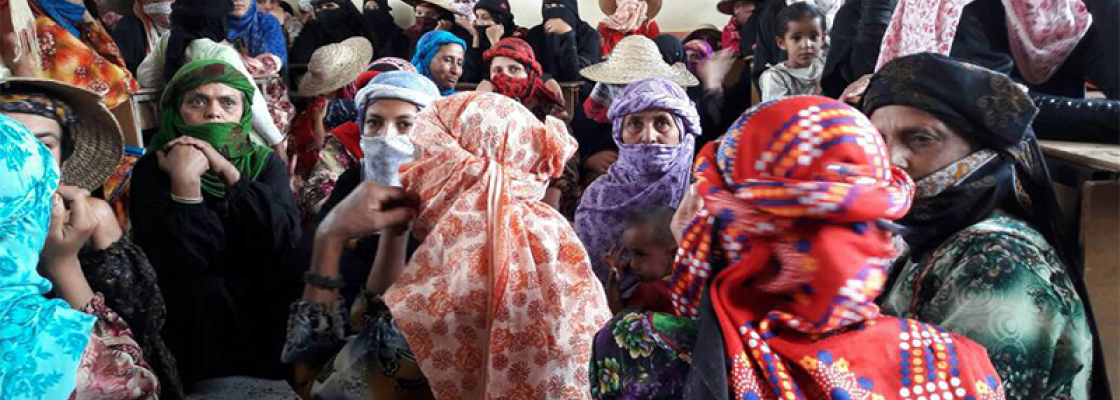
Employing women in cleaning rainwater harvesting reservoir,in the city of Jihanah,Governo rate of Sana’a.
A unique experience implemented by the PWP under the YECRP.
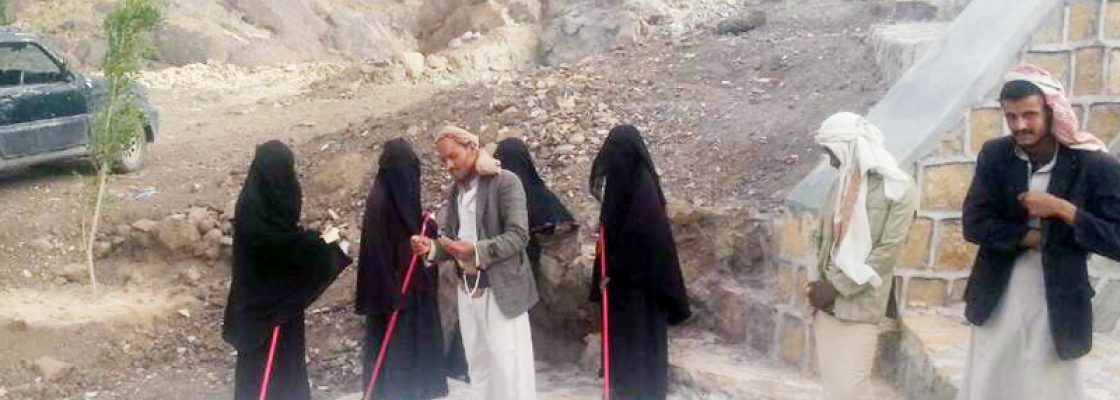
PWP Strengthens Women Participation in Identifying Priorities and Project Selection
The Project Implementation Unit of the PWP pays a lot of attention to the strengthening of women’s participation in identifying priorities and projects in target areas.
PWP’s has sent female social counselors to local communities to meet with women and to listen to their concern. The aim is to identify their needs and what projects are important to them.
In doing so, PWP has ensured that women participate in identifying priorities and projects to be implemented during the initial phase of field survey and assessments of the needs of the local communities.
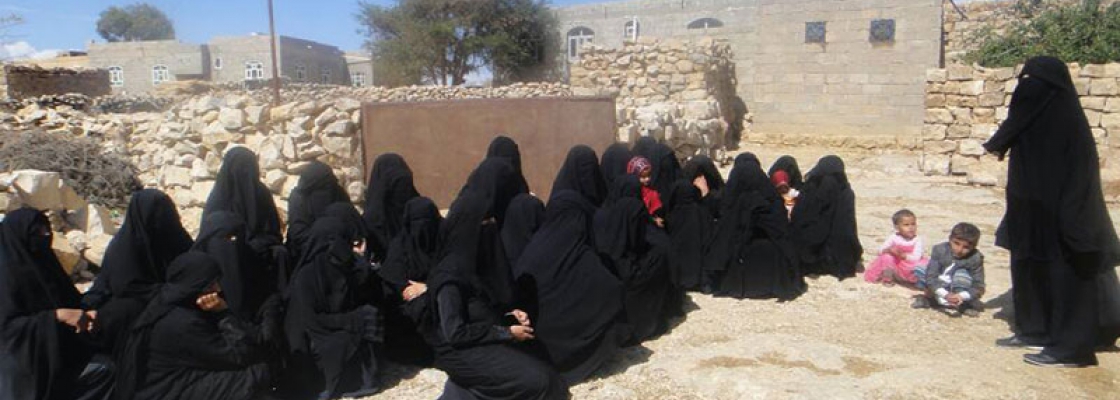
Amran governorate
Amran governorate witnessed a successful and pioneering experiment by the PWP that transformed hundreds of unemployed women to productive families with income generating projects that have had positive impacts on improvement of livelihood for many families that were suffering poverty and unemployment.
Good fruit:
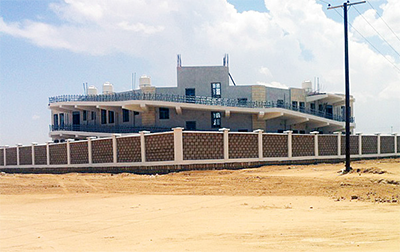 The productive families project in Amran city is a good fruit of PWP intervention in upgrading women›s qualification and a successful experiment achieving positive impact on many families as stated by Aman Allah Al-Dhabari one of the graduates of the center in the field of sewing top-notch belts. Similarly there are tens of women who became producers of income generation handicrafts that realized livelihood prosperity to their families.
The productive families project in Amran city is a good fruit of PWP intervention in upgrading women›s qualification and a successful experiment achieving positive impact on many families as stated by Aman Allah Al-Dhabari one of the graduates of the center in the field of sewing top-notch belts. Similarly there are tens of women who became producers of income generation handicrafts that realized livelihood prosperity to their families.
This sector has proved extremely successful in transforming livelihoods of important segments of the society who were complaining from marginalization and deprivation such as women and persons with special needs to be active and productive elements after being sufferers of poverty and need.
Through its interventions in the vocational training and social affairs, PWP was able to qualify workforce especially among women through giving them income generation skills and crafts.
The planning process to integrate gender issues and women in the interventions, development programs and projects requires understanding the different social roles, responsibilities and activities of women and men, as such differences result in different needs whether practical or strategic, where in the past attention was focused on the society without giving any consideration to this difference and as a result the role of women is mostly disregarded in the development process despite the fact that their participation is a principal pillar.
To strengthen that participation, attention must be given to the different roles of men and women and the different relations and interactions between those prevalent relations and roles. This grasp is the cause behind the strong attention to the gender which simply means realizing that in each environment the needs and roles of men and women are different.
Women often are prohibited from attending village meetings or if permitted, they have no right to talk and even when this prohibition is traditional rather than official this must be taken into consideration and what happens mostly is that women authorized to participate in such meetings are not representatives of all the local women and hence it is necessary to be aware of such facts. In each segment of a participant groups we need to think in the specific roles and needs of men and women.
It is important to encourage and increase women participation and the challenge here is how to attract women to participate in the issues of concern to them and seeking to solve those problems instead of inciting them. Again, and based on customs and traditions in each environment the methods of establishing communication and participation will be different as it is often necessary to deal first with men and then bring the women groups and discuss matters with them.
Finally, these considerations related to men and women and their roles and specific needs are also valid for application when dealing with the youth of each sex separately as for example there is a clear difference between the roles and needs of girls and those of the elder women.




